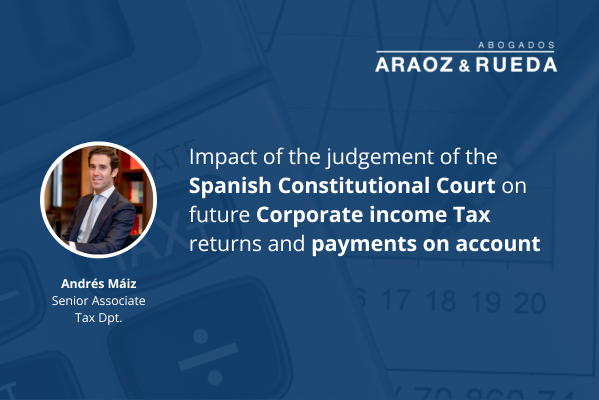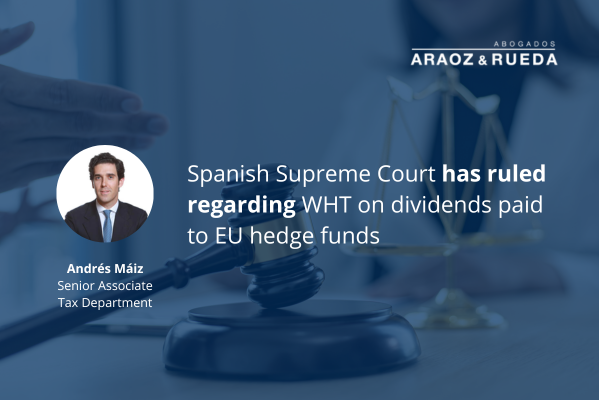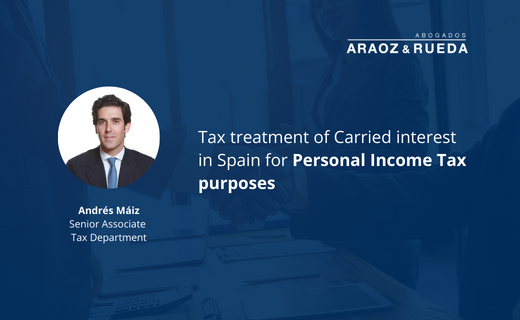Download the PDF document here
1. Introduction
On 30 January 2020 the World Health Organization (WHO) declared that COVID-19 involved a public health emergency of international importance. As a result of this crisis being increased, Spain, among other states, has taken certain measures restricting the freedom of movement of their citizens, limiting or restricting the entry of travellers from countries with outbreaks of COVID-19 and adopting various types of provisions, in order to protect the health of citizens and mitigating, as far as possible, the economic consequences of this situation. Further, on 11 March, WHO confirmed that the COVID-19 outbreak had become a pandemic.
On Saturday 14 March 2020, the declaration of the state of alarm was published in the Spanish Official Gazette as a response to the public health crisis caused by COVID-19.
This situation has been addressed in Spain with the approval of, among others:
- the Royal Decree 463/2020, of 14 March, which declared a state of alarm for the management of the health crisis caused by COVID-19, has established a series of extraordinary measures to protect the health and safety of citizens, contain the spread of the disease and strengthen the public health system; and
- the Royal Decree-Law 8/2020, of 17 March, on urgent extraordinary measures to address the economic and social impact of COVID-19, pursuant to which a wide range of extraordinary measures have been adopted to mitigate the economic and social consequences of COVID-19 and to prevent the economic impact from spreading beyond the duration of the health crisis.
2. The state of alarm
In accordance with the Organic Law 4/1981, of 1 June, on the states of alarm, emergency and siege, the Spanish Government may declare the state of alarm, emergency or siege when, due to extraordinary circumstances, it is impossible to preserve normal conditions by means of the ordinary powers granted to the relevant authorities.
The state of alarm is the least critical of the three states of emergency provided for in the Spanish Constitution. It can be declared, in all or part of the country, when there are serious disruptions to normal conditions such as (i) catastrophes, calamities or public disasters (e.g. earthquakes, floods, fires or major accidents…), (ii) health crisis, such as epidemics or serious pollution situations; (iii) the breakdown of essential public services for the community; or (iv) shortages of basic necessities.
The term of the state of alarm is 15 fifteen calendar days from its publication. This period may be extended with the prior authorisation of the Spanish Congress.
As a summary, the following exceptional measures, among others, have been adopted pursuant to the RD 463/2020:
- The Government has been designated as the competent authority and, under the direction of the President of the Government, the Ministers of the Home Affairs, Health, Defence and Transport, Mobility and the Urban Agenda as the delegated competent authorities.
- The competent authority and the delegated competent authorities have been given extraordinary powers to issue the orders, resolutions, provisions and interpretative instructions which, in the specific sphere of their action, are necessary to guarantee the provision of all services, ordinary or extraordinary, for the protection of persons, goods and places.
The competent delegated authorities have been likewise given broad powers to implement, as appropriate, a set of measures aimed at strengthening the National Health System throughout the national territory, ensuring the supply of goods and services necessary for the protection of public health, food supply and the supply of electrical energy, petroleum products and natural gas, and regulating mobility and transport services. These measures may be taken without any administrative procedure, but are subject to judicial review.
- A number of measures have been adopted to contain the spread of the disease, including but not limited to:
- limiting the freedom of movement of persons during the state of alert, except for a number of assessed activities, including travelling to the place of work to perform the relevant work, professional or business activity;
- the suspension of face-to-face educational activity in all centres and stages, cycles, grades, courses and levels of education, including university education, as well as any other educational or training activities provided in other public or private centres; and
- the general suspension of the opening to the public of retail premises and establishments, as well as hotel and restaurant activities, except for deliveries to home delivery services.
- The procedural and administrative time limits have been suspended.
The extraordinary measures adopted to mitigate the economic and social consequences of COVID-19 and prevent the economic effect from spreading beyond the duration of the health crisis pursuant to the RDL 8/2020.
Pursuant to RDL 8/2020 a wide range of extraordinary measures have been adopted to mitigate the economic and social consequences of COVID-19 and prevent the economic effect from spreading beyond the duration of the health crisis. In accordance with the explanatory statements of RDL 8/2020, it seeks three main targets:
- To strengthen the protection of workers, families and vulnerable groups, including measures to guarantee home care for dependent persons, to ensure the continuity of energy and water supplies and the provision of telecommunications services and to make possible a moratorium on the payment of mortgage instalments by vulnerable groups.
- To support productive activity and the maintenance of employment, through the adoption of a set of measures to make the mechanisms for temporary adjustment of employment more flexible and rapid, also strengthening the options for coverage of employees and mitigating the costs relating to social security contributions for certain companies that meet the objectives of maintaining employment.
- To provide temporary support to companies facing liquidity pressures as a result of the cessation or reduction of activity, with a view, inter alia, to (i) establishing different alternatives for promoting financing, including a line of guarantees on behalf of the state of up to 100,000 million, the net borrowing capacity of the Instituto de Crédito Oficial is increased to provide financing mainly for small and medium-sized enterprises and the self-employed, and CESCE’s coverage is reinforced to increase the coverage on behalf of the state of its guarantees, (ii) various tax measures are adopted to make the deadlines applicable to certain tax obligations and procedures more flexible, and (iii) a special regime is provided for the suspension of public contracts, prohibiting their termination, in order to avoid negative effects on employment and business viability in these contracts.
Unless otherwise expressly provided for, the measures provided for in RDL 8/2020 will be in force for one month from their publication (i.e. until 18 April 2020), unless an extension is agreed by royal decree.
3. Corporate
In accordance with RDL 8/2020 a series of measures aimed at solving obstacles and alleviating difficulties faced by companies during the health crisis have been adopted (arts. 40 and 41 RDL 8/2020).
a. Managing body
During the state of alarm and even if not provided for in the bylaws:
- Meetings of the managing body and other committees (delegated, compulsory and voluntary) may be held by videoconference.
- Resolutions of the managing body and other committees (delegated, compulsory and voluntary) may be adopted in writing and without a meeting if the chairman so decides or if two of the members so request. It will not therefore be necessary during this period for all directors to agree to this procedure for adopting resolutions as is currently the case.
b. Drawing up and approval of the annual accounts
- The deadline for drawing up the annual accounts (individual and consolidated) shall be three months from the date of completion of the state of alarm. And, the deadline for the general meeting to meet to discuss their approval is another three months from the end of the deadline for their drawing up. In the case of listed companies, it has been decided to give them a certain period of time to hold the 2020 ordinary general meeting until 30 October.
- In the case of companies subject to mandatory audit, if on the date of the declaration of the alarm state the administrative body has already formulated the annual accounts, the period for their verification by the auditor is extended by two months from the end of the alarm state.
c. General meeting
- The management body may cancel or change the place and time of the general meeting called before the declaration of the state of alarm. To do so, a notice must be published at least 48 hours before the scheduled date on the company’s website and, if it does not have one, in the Spanish Official Gazette. In the event that the meeting is cancelled, the administrative body must call it within the month following the end of the state of alarm.
- The notary required to attend the general meeting of partners to take the minutes of the meeting may do so by means of remote communication in real time to ensure the fulfillment of its function.
d. Other measures
- Shareholders may not exercise the right of legal or statutory separation.
- Those companies for which its term has expired will not be dissolved automatically. The dissolution will only take place two months after the end of the state of alarm.
- Regarding companies that incur legal or statutory causes of dissolution, the period of notice of the general meeting by the administrative body (to agree on the dissolution or to cure the cause of dissolution) is suspended until the end of the state of alarm. If the cause for dissolution occurs during the state of alarm, the directors will not be liable for the corporate debts incurred during this period, which will allow the directors to act with a certain degree of security and without fear of personal liability for corporate debts during this period.
c. Measures applicable to listed companies
During the financial year 2020, RDL 8/2020 (art. 41) has adopted certain exceptional measures applicable to companies with securities admitted to trading on a regulated market in the EU. In particular:
- The publication and submission to the Spanish Securities and Exchange Commission (CNMV) of the annual financial report and the audit report may be carried out up to six months from the end of the financial year. For the usual case of companies whose financial year coincides with the calendar year, until 30 June 2020. On 18 March, the Alternative Stock Market adopted an equivalent rule for companies whose shares are included in any of the segments of the said market.
- The period for holding the ordinary general shareholders’ meeting is extended until 30 October 2020.
4. Banking and Finance
a. The mortgage moratorium
- The RDL 8/2020 (arts. 7 to 16) provides a moratorium in favour of mortgage debtors who are in a situation of special vulnerability under the terms set forth therein.
- Only loans or credits secured by a real estate mortgage and intended for the acquisition of the habitual residence may benefit from the moratorium.
- Only debtors who are in a particularly vulnerable situation under the terms of RDL 8/2020 will be able to benefit from the Moratorium. The Moratorium will also apply to the principal debtor’s guarantors and guarantors as well as to non-debtor mortgagees.
- Article 9.1 of RDL 8/2020 sets forth the criteria that determine the debtor’s situation of vulnerability:
- That the mortgagor becomes unemployed or, in the case of an entrepreneur or professional, suffers a substantial loss of income or a substantial drop in sales (at least 40%).
- That the total income of the members of the family unit does not exceed, in the month prior to the application for the moratorium, a multiple of the Public Multiple Effect Income Indicator (IPREM) determined in RDL 8/2020 in view of certain circumstances of the family unit.
- That the mortgage payment, plus basic expenses and supplies, be greater than or equal to 35 percent of the net income received by all members of the family unit.
- That, as a result of the health emergency, the family unit has suffered a significant alteration in its economic circumstances in terms of the effort required to access housing, in the terms defined in RDL 8/2020.
- Debtors who can benefit from the moratorium in accordance with the provisions of paragraphs 1 and 2 above may apply to their creditor entity up to fifteen days after the end of the validity of RDL 8/2020.
- The moratorium will entail, during the period stipulated for it:
- the suspension of the mortgage debt (no additional interest shall accrue – neither ordinary nor moratorium – and no payment of principal or interest on the loan or credit may be demanded).
- the impossibility for the creditor entity to apply the early termination clause in the contract.
b. Promoting liquidity
RDL 8/2020 has established various measures to promote liquidity, including the following:
- Guarantee line on behalf of the State. A line of guarantees on behalf of the state has been set up through which the Ministry of Economic Affairs and Digital Transformation may grant guarantees for the benefit of companies and self-employed persons for a maximum amount of up to 100 billion euros, in order to cover both loan renewals (which must be understood as including the rehabilitation of the available tranche of existing financing contracts) and new financing. The applicable conditions and requirements to be met, including the term of the guarantee, will be established by agreement of the Council of Ministers, with no further development required.
- Debt of Instituto de Crédito Oficial. The net borrowing capacity of the Instituto de Crédito Oficial provided for in the state budget law has been increased by 10 billion euros to provide additional liquidity to companies, especially SMEs and the self-employed, through existing ICO financing lines. The ICO is empowered to adopt the necessary measures to make the financing available more flexible and extensive, and these measures must therefore be implemented in order to confirm the terms on which the financing can be accessed.
- Extraordinary line of insurance coverage. For a maximum period of six months from the entry into force of RDL 8/2020, the capacity of CESCE4 to provide insurance coverage charged to the Internationalization Risk Reserve Fund (Fondo de Reserva de los Riesgos de la Internacionalización) has been increased by 2,000 million euros.
- Small and medium-sized companies (as defined in Annex I to Commission Regulation EU 651/2014), as well as other larger companies may benefit from this coverage provided that (i) they are not listed; (ii) their international business represents at least one third of their turnover or they are companies that have regularly exported during the last 4 years in accordance with the criteria; (iii) they have liquidity difficulties derived from the COVID-19; and (iv) they are not in a situation of bankruptcy or pre-bankruptcy or in a situation of non-payment of debts to public sector companies or to the administration.
5. Insolvency and bankruptcy
Article 43.1 of RDL 8/2020 establishes that, while the state of alert is in force, the debtor who is in a state of insolvency will not have the duty to request the declaration of bankruptcy.
Likewise, once the state of alarm has ended, the Courts will not admit any applications for the necessary tender (including those submitted during the state of alarm) until two months have passed since the end of the state of alarm. It is also established that applications for voluntary competition will be admitted with preference, even if they are later than the necessary ones that have been presented.
In addition, art. 43.2 of RDL 8/2020 provides that those debtors who have informed the Court of the commencement of negotiations with creditors under art. 5 bis Insolvency Law, will not be obliged to apply for the insolvency proceedings while the state of alarm is in force, even if the period provided for in the aforementioned art. 5 bis Insolvency Law has expired.
These provisions are complemented by the general suspension of deadlines and legal proceedings provided for in the RD 463/2020, in which bankruptcy proceedings are not exempt from such suspension in principle.
6. Restrictions on foreign investment
The Fourth Final Provision of RDL 8/2020 amends the foreign investment regime (Law 19/2003), suspending the liberalization of certain foreign direct investments in Spain.
For these purposes, foreigners are investors resident outside the European Union and the European Free Trade Association holding more than 10% of the capital or those which , after the transaction is completed, participate “effectively in the management or control” of the Spanish company.
During the suspension, the foreign investments affected will require prior administrative authorization in order to be made. If they are made without authorization, they will have no validity or legal effect and will constitute an infringement punishable by, among other things, fines of up to the amount of the investment made.
The need for prior administrative authorization will be maintained until the Council of Ministers agrees otherwise.
The foreign investments affected are:
- Those made in companies in certain sectors listed in RDL 8/2020 and which the latter considers to affect public order, public security and public health. In particular, the sectors affected by this measure are critical infrastructures (e.g. energy, transport, water, health, defence), critical technologies (e.g. artificial intelligence, defence, biotechnology), the supply of essential inputs (e.g. energy), sectors with access to sensitive information (e.g. personal data) and the media. The Government is also authorized to extend the regime to investments in other sectors.
- Those carried out by certain foreign investors, regardless of the sector in which the Spanish entity concerned operates. This includes investors controlled by foreign governments, those already involved in sectors that affect public safety, order and health in other Member States, and those that may have committed criminal or illegal activities in other Member States or elsewhere.
7. Real Estate
As a result of the RD 463/2020 declaring the state of alarm, all the operators of retail premises have been legally obliged to close the premises and stop their activity (with some exceptions like supermarkets or pharmacies). This has been generally characterized under Spanish law as an event of suspension of all retail leases in Spain. Accordingly, all tenant’s rights and obligations under the leases within the scope of the prohibition (and, specifically, the obligation to pay rent) are currently suspended during the duration of the state of alarm.
In that context, our suggestions to clients have been as follows:
- For tenants: to formally notify the suspension of the leases to the relevant landlord as soon as possible (including any possible extension of the state of alarm). In addition, we have suggested them to request to landlords an additional reduction of rent to be applicable to the months following the state of alarm, based on the expected substantial reduction of commercial activity (and the general economic impact) resulting from the COVID-19 global health crisis.
- For landlords: to accept suspension declarations coming from tenants and, if at all possible, to anticipate to them, declaring the suspension themselves and proposing that the suspended rent is paid during the next 6 or 12 months. This is the approach actually taken by some big Spanish real estate companies during the past week
Regarding construction projects, and although the RD 463 / 2020 does not provide for the forced stop and closure of the works, the restrictions on movement have led in practice to the suspension of a number of projects (in some cases the suspension has been ordered by the relevant Councils involved). This trend is likely to continue over the coming weeks.
8. Other measures
a. Public notary services
On 15 March, the Directorate-General of Legal Security and Public Trust issued an instruction which states that the public notary service is a public service of general interest whose provision must be guaranteed throughout the national territory, and the notary may not close the notarial office since it is a public office.
The aforementioned instruction establishes that as long as the state of alarm in Spain lasts, the notary will only attend to urgent matters, and may reject any matter that is not deemed urgent.
In the event of an urgent matter, the provision of the public notary service will be subject to, among others, the following:
- Access to the notary’s office will not be granted to anyone other than the relevant party.
- The notary’s office will be the only place where the notary will carry out notarial services.
- The relevant party will attend the notary’s office on the day and time indicated by the notary.
b. Public registry services
On 15 March, the Directorate-General of Legal Security and Public Trust, issued a resolution in order to adopt measures that guarantee the adequate provision of public registry services, since land, commercial and movable property registries are public services of general interest that must remain open. The measures established are, among others:
- The suspension of the periods of prescription and expiration of any actions and rights during the duration of the state of alarm and, where appropriate, any extensions adopted.
- The Registrars must devote at least two hours a day, within office hours, to informing the public on matters related to the Registry, with this attention to the public being provided exclusively by e-mail or telephone.
- Requests for land registry excerpts (notas simples) and certifications must be made exclusively through the website and must demonstrate a legitimate interest.





